
Kiss Me, Kate is a musical written by Bella and Samuel Spewack with music and lyrics by Cole Porter. The story involves the production of a musical version of William Shakespeare's The Taming of the Shrew and the conflict on and off-stage between Fred Graham, the show's director, producer, and star, and his leading lady, his ex-wife Lilli Vanessi. A secondary romance concerns Lois Lane, the actress playing Bianca, and her gambler boyfriend, Bill, who runs afoul of some gangsters. The original production starred Alfred Drake, Patricia Morison, Lisa Kirk and Harold Lang.
The Matchmaker is a 1954 play by Thornton Wilder, a rewritten version of his 1938 play The Merchant of Yonkers.

Fred Ebb was an American musical theatre lyricist who had many successful collaborations with composer John Kander. The Kander and Ebb team frequently wrote for such performers as Liza Minnelli and Chita Rivera.
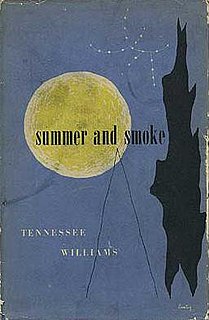
Summer and Smoke is a two-part, thirteen-scene play by Tennessee Williams, completed in 1948. He began working on the play in 1945 as Chart of Anatomy, derived from his short stories "Oriflamme" and the then-work-in-progress "Yellow Bird." The phrase "summer and smoke" probably comes from the Hart Crane poem "Emblems of Conduct" in the 1926 collection White Buildings. After a disappointing Broadway run in 1948, the play was a hit Off-Broadway in 1952. Williams continued to revise Summer and Smoke in the 1950s, and in 1964 he rewrote the play as The Eccentricities of a Nightingale.

Guys and Dolls is a musical with music and lyrics by Frank Loesser and book by Jo Swerling and Abe Burrows. It is based on "The Idyll of Miss Sarah Brown" (1933) and "Blood Pressure", which are two short stories by Damon Runyon, and also borrows characters and plot elements from other Runyon stories, such as "Pick the Winner".
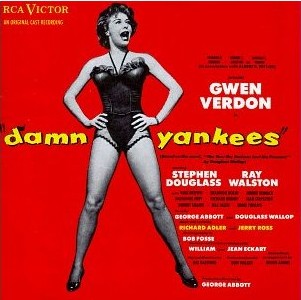
Damn Yankees is a 1955 musical comedy with a book by George Abbott and Douglass Wallop, music and lyrics by Richard Adler and Jerry Ross. The story is a modern retelling of the Faust legend set during the 1950s in Washington, D.C., during a time when the New York Yankees dominated Major League Baseball. It is based on Wallop's 1954 novel The Year the Yankees Lost the Pennant.

Glengarry Glen Ross is a play by David Mamet that won the Pulitzer Prize in 1984. The play shows parts of two days in the lives of four desperate Chicago real estate agents who are prepared to engage in any number of unethical, illegal acts—from lies and flattery to bribery, threats, intimidation and burglary—to sell undesirable real estate to unwitting prospective buyers. It is based on Mamet's experience having previously worked in a similar office.
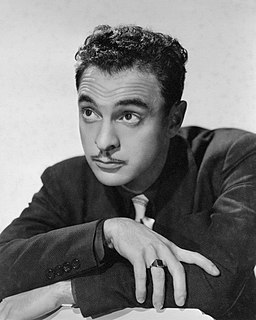
Sam Levene was an Russian-born American Broadway, film, radio and television actor and director. In a career spanning over five decades, he originated some of the most legendary comedic roles in American theatrical history, including Nathan Detroit, the craps-shooter extraordinaire, in the 1950 original Broadway production of Guys and Dolls (1950), Max Kane, the hapless agent, in the original 1932 Broadway production of Dinner at Eight (1932); Patsy, a professional if not always successful gambler, in the longest running and original Broadway production of Three Men on a Horse (1935); Gordon Miller, the shoestring producer, in the original Broadway production of Room Service (1937); Sidney Black, a theatrical producer, in Moss Hart's original Broadway production of Light Up the Sky (1948), Horace Vandergelder, the crotchety merchant of Yonkers, in the premier UK production of Thornton Wilder's The Matchmaker (1954), a play that became the basis for the musical Hello Dolly, Lou Winkler, a businessman in the original Broadway production of Fair Game (1957) a comedy by Sam Locke that Larry Gelbart attributed its 217-performance run mostly to the performance and drawing power of Sam Levene who starred in the comedy with Ellen McRae, a 25-year ingenue making her Broadway debut and who later changed her name to Ellen Burstyn; and Al Lewis, the retired vaudevillian, in the original Broadway production of The Sunshine Boys (1972), Neil Simon’s salute to vaudevillians opposite Jack Albertson as Willie Clark, a role Levene performed 466 times on Broadway, first with Jack Albertson until October 28, 1974 and later opposite Jack Gilford, October 30, 1974 until February 10, 1975. In 1984, Levene was posthumously inducted in the American Theatre Hall of Fame and in 1998, Sam Levene along with the original Broadway cast of the 1950 Guys and Dolls Decca cast album posthumously inducted into the Grammy Hall of Fame.
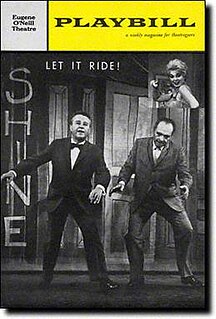
Let It Ride is a Broadway musical based on the 1935 Broadway farce Three Men on a Horse by George Abbott and John Cecil Holm. The musical, with book by Abram S. Ginnes and music and lyrics by Jay Livingston and Ray Evans, choreographer Onna White, assistant choreographer Eugene Louis Faccuito (Luigi), opened on Broadway in New York City at the Eugene O'Neill Theater on October 12, 1961, and played 69 performances including one preview. The original Broadway production co-starred George Gobel and Sam Levene and featured Barbara Nichols and Paula Stewart.
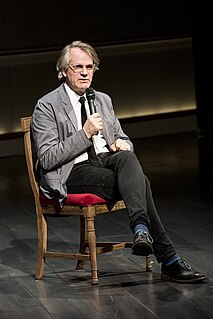
Bartlett B. Sher is an American theatre director. The New York Times has described him as "one of the most original and exciting directors, not only in the American theater but also in the international world of opera". Sher has been nominated for nine Tony Awards, winning a Tony Award for Best Direction of a Musical as well as a Drama Desk Award for his direction of the 2008 Broadway revival of South Pacific.

Twentieth Century is a 1932 play by Ben Hecht and Charles MacArthur based on the unproduced play Napoleon of Broadway by Charles B. Millholland, inspired by his experience working for the eccentric Broadway impresario David Belasco.
Jack O'Brien is an American director, producer, writer and lyricist. He served as the Artistic Director of the Old Globe Theatre in San Diego, California from 1981 through the end of 2007.

Yellow Jack is a 1938 film released by Metro-Goldwyn-Mayer based on the 1934 play Yellow Jack. Both were co-written by Sidney Howard and Paul de Kruif.
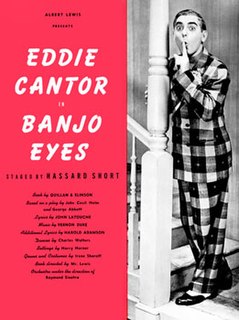
Banjo Eyes is a musical based on the play Three Men on a Horse by John Cecil Holm and George Abbott. It has a book by Joseph Quinlan and Izzy Ellinson, music by Vernon Duke, and lyrics by John La Touche and Harold Adamson.
They Knew What They Wanted is a 1924 play written by Sidney Howard. The play premiered on Broadway in 1924 and had three Broadway revivals, as well as a London production.
Three Men on a Horse is a 1936 comedy film directed and produced by Mervyn LeRoy, adapted from the Broadway play of the same name written by George Abbott and John Cecil Holm. A mild-mannered greeting card poet has the uncanny ability to pick winners in horse races.

Best Foot Forward is a 1941 musical with songs by Hugh Martin and Ralph Blane and a book by John Cecil Holm. Produced by George Abbott, after an out-of-town tryout, the production opened on Broadway on October 1, 1941 at the Ethel Barrymore Theatre, where it ran for 326 performances. It was directed by Abbott, with choreography by Gene Kelly, and starred Rosemary Lane. The show was Nancy Walker's Broadway debut and also launched June Allyson to stardom. Sets and lighting were by Jo Mielziner, and costumes were by Miles White.

Dinner at Eight is a 1932 American play by George S. Kaufman and Edna Ferber. The plot deals with the Jordan family, who are planning a society dinner, and what they, as well as various friends and acquaintances—all of whom have their own problems and ambitions‚ do as they prepare for the event. The film adaptation Dinner at Eight followed and Mentone Productions released the spoof Supper at Six. Several revivals, a made-for-TV movie, and an opera followed.
Sam Locke was an American writer and director who worked in theatre, television, and film.

Paris Is Out! is a 1970 Broadway comedy by Richard Seff that starred Sam Levene and Molly Picon as Daniel and Hortense Brand, a married couple planning a vacation. The Broadway production ran for 96 performances after 16 previews at the Brooks Atkinson Theatre between February 2 and April 18, 1970.















